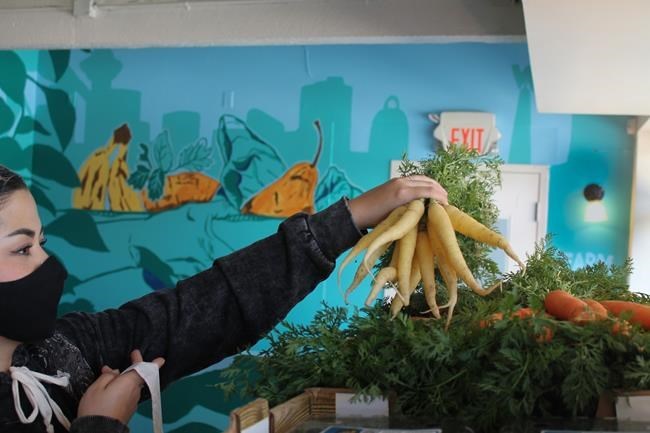VANCOUVER — More than 35.5 million tonnes of food is thrown out each year in Canada, but one group in Vancouver is hoping to divert some of that to help people who are food insecure.
The Food Stash Foundation opened the doors to the Rescued Food Market for the first time Friday, allowing patrons to shop and pay what they want in a donation that will help keep the market running,
Food Stash executive director Carla Pellegrini said the pay-what-you-feel model eliminates any stigma associated with not being able to afford the rising costs of food.
"We rescue over 70,000 pounds of food every month," she said. "We have a huge food waste problem, so it's not a supply issue we're dealing with, it's a distribution issue and we're trying to bridge that gap."
Second Harvest, Canada's largest food rescue organization, said in a 2019 report that nearly 60 per cent of food produced in Canada was wasted annually, a nearly $50-billion loss. Of that, 32 per cent of the wasted food is edible and could be redirected to those in need.
Research from Simon Fraser University, released in July, found food waste on British Columbia farms could be prevented with better policies and processing infrastructure.
Tammara Soma, the research director of the food systems lab at Simon Fraser University, said much of the waste is created because large food retailers have stringent esthetic standards for produce that often aren't met.
She said farmers also aren't given the tax incentives to pay their costs of harvesting and transporting food that would be donated.
Food should be a human right in Canada, Soma said, so it's important to create more alternative markets, like the Rescued Food Market, that would benefit farmers by allowing them sell the unmarketable food, and shoppers who could then pay a reduced price for fresh produce.
The market, she said, is a dignified solution for low-income shoppers who may not want to use services like food banks.
"What's really unique about this initiative is people have a choice in what food they are getting, so it's much different from the typical donation model," Soma said. "It reduces stigma and brings people together to join community interests from both an environmental and social perspective."
The Rescued Food Market will complement the foundation's new community fridge, which sits in front of the Vancouver building and is stocked with food that is accessible to people at all times.
The market will be open from 3:30 to 6 p.m. every Friday.
This report by The Canadian Press was first published Oct. 1, 2021.
This story was produced with the financial assistance of the Facebook and Canadian Press News Fellowship.
Brieanna Charlebois, The Canadian Press



